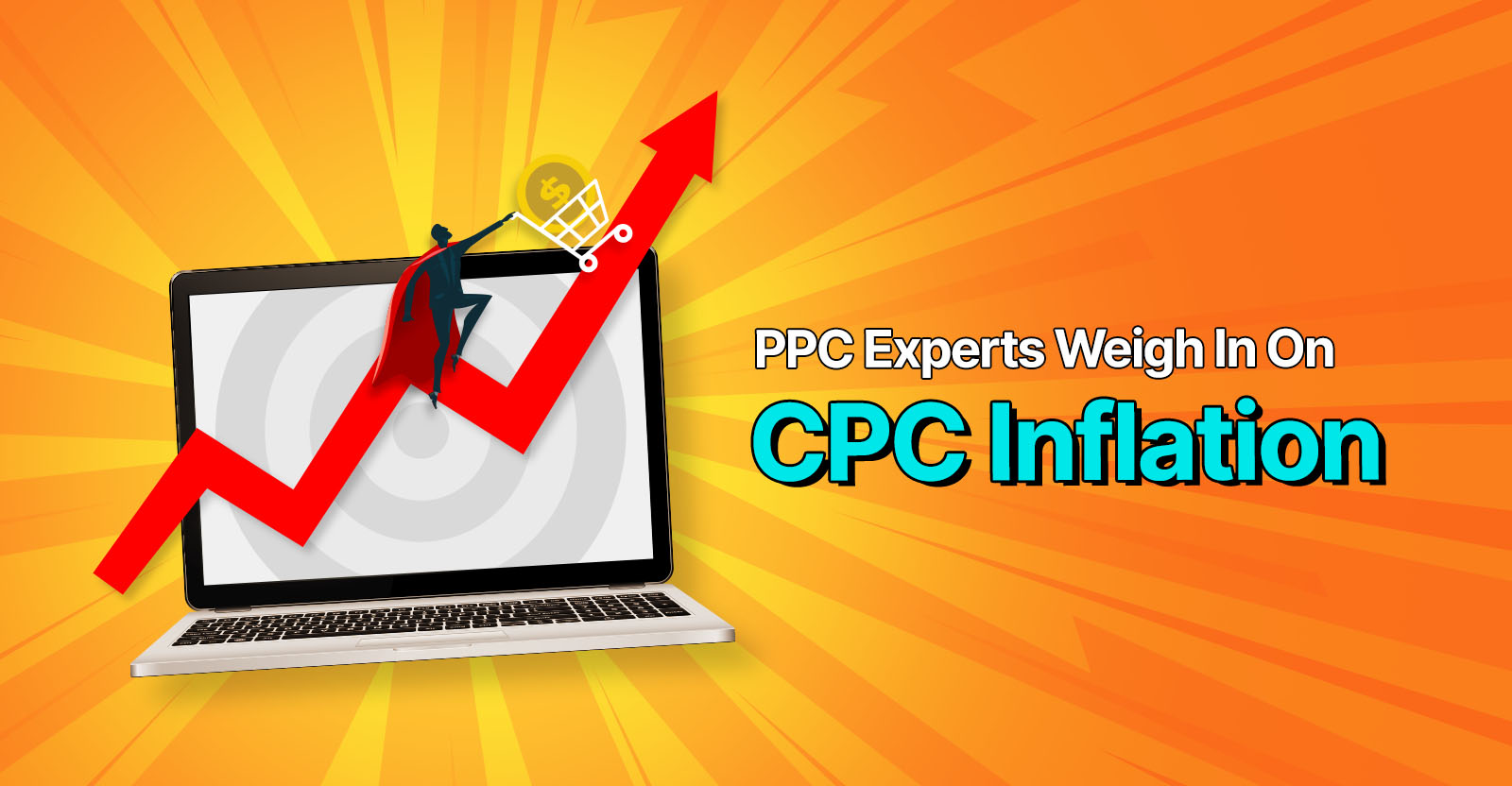This is an excerpt from SEJ’s PPC Trends 2024 ebook, our annual roundup of expert opinions on what you can expect over the course of the next 12 months.
Inflation is hitting everywhere, even your ad auctions.
This year, the contributors offer guidance on navigating these increasing costs. Some note that directly seeking lower cost-per-click (CPC) prices may not be the answer.
The advice includes:
- Validate and own your campaign performance data to ensure that you have an accurate picture of expense and revenue.
- Focus on business outcomes instead of individual key performance indicators (KPIs) like CPC.
- Improve the quality of the campaigns and the value of conversions.
- Diversify your campaigns to target different intents, buyer stages, and platforms.
The common thread that runs through the quotes is that you will be more successful extracting as much value as you can out of CPCs as they are, than you will be chasing cheaper options. A cost doesn’t mean much until weighed against its benefit.
In the coming year, you’ll likely need to be very good at cost and benefit analysis.
If I had to summarize this article’s insights in three sentences, they would be:
- Cost-cutting, for its own sake, isn’t always the way.
- Don’t obsess over what you can’t control; make the higher cost worth it.
- Don’t mindlessly follow the metrics fed to you. Validate your data.
Improve The Value Of A Click Instead Of Trying To Reduce The Cost
Amy Hebdon, Founder + Managing Director, Paid Search Magic

First, understand that cost per click (CPC) is not a strong key performance indicator (KPI).
The worst response to rising click costs is to attempt to lower average CPCs by adding lower-cost (and lower-quality) clicks.
Instead, work to get even more value from premium clicks by increasing the likelihood of conversion. Focus on landing page user experience (UX), clarify your offer to make it more desirable, and qualify your audience so that each click will likely result in a new customer.
By measuring and increasing profit per click, the impact of rising click costs diminishes.
You Can’t Control CPC, So Focus On What You Can
Andrea Atzori, Director, Ambire

Given the increasing concerns about what seem to be well-established trends of rising cost per clicks (CPCs) – along with recent disclosures of orchestrated auctions and CPC hikes within certain advertising platforms – it comes as no surprise that the issue of CPC inflation has emerged as a matter of paramount concern for the vast majority of marketers and businesses.
Many who rely on paid media campaigns as a cornerstone of their strategies – whether aiming to draw traffic, facilitate customer acquisition, or both – have seen the impact of CPC inflation firsthand.
There is no doubt that, especially for small and medium enterprises, these are tough times. We have all heard stories of business owners concerned about how difficult it is just to make do.
So, should those entering the market now or not having the means to challenge bigger budgets just give up altogether and look for other options?
In my opinion, absolutely not. Although difficult, things can still be done to alleviate high advertising costs and direct campaigns toward higher profitability.
To start, we can focus on improving the overall campaign’s and ad’s quality; this is a given – a fundamental aspect that cannot be overlooked.
But we can also look at improving other metrics for which we have more direct control, like conversion rates and average transaction values.
Basic things and common sense will go a long way here.
Furthermore, we must shift our attention from marketing indicators to actual business objectives and measurements.
This means moving away from outdated attribution models like last click, and focusing more on business-focused outcomes like customer lifetime value (CLV) and profit margin.
In our endeavors to efficiently handle the challenge of increasing CPC across well-known advertising platforms like Google Ads and Facebook, it is vital to investigate alternative and less competitive avenues.
Platforms focused on more niche topics and phrases, such as Quora and Reddit, can offer opportunities to alleviate the financial burden linked to costly CPCs and highly competitive search terms.
Consequently, as we plan for 2024, we must emphasize experimentation and testing on less saturated platforms.
By diversifying our advertising channels and contemplating these alternatives, we can optimize our advertising budget, extend our reach to a wider audience, and reduce the impact of escalating CPCs.
Ultimately, CPCs are just a number – a number that is relative to its context and that, as such, can only be measured within that context.
So, while our ability to control inflating CPCs might be generally low, focusing on what we can do to influence the context might help us to strive for and deliver above-average results and, as such, worry less about CPCs.
Make Your Marketing Cost-Effective By Targeting Different Funnel Stages & Platforms
Corey Morris, President/CEO, Voltage
Handling CPC Inflation

As historical data suggests – and trends continue to rise – the cost per click (CPC) for Google Ads is expected to increase across various industries in 2024. This comes in a year when the economy has already faced its share of challenges.
Between 2022 and 2023, the average CPC increased by approximately 5% and cost per lead (CPL) by about 20%, signifying a significant jump from previously documented years. Reflecting on past CPC inflation rates, the projected CPC for 2024 is expected to continue upward.
One major cause of rising CPC rates is competition. An increasing number of businesses are establishing their online presence. Securing that top spot in search results becomes increasingly challenging, unfortunately driving up the CPC.
To combat the rising costs, the most important thing to do is to be aware. Acknowledge the rising costs and formulate a strategy that benefits your clients without straining their finances or reducing ad spend.
How do you address the rising costs for yourself or your clients?
Consider diversifying your approach by launching ad campaigns targeting different stages of the funnel. Applying this strategy helps optimize your marketing cost, which allows for implementing other cost-effective marketing tactics like email marketing, social media, and SEO, which complement your paid search campaigns.
Own Your Sources Of Truth & Understand The Value Of A Lead
Navah Hopkins, Evangelist, Optmyzr

The big theme of 2024 is owning your sources of truth and acknowledging that you will need to test many “proven” strategies and mechanics. While every year can lay claim to “getting comfortable with not being comfortable,” I expect 2024 to be particularly full of tests and questions.
A few contributing factors to this are:
1. Due to the recent evidence of inflating cost per click (CPC) and influencing the order of ad auction winners, there is some hesitancy around (Google) ad platform tech and its reporting. While there are valid reasons why auction winners or ad prices have been adjusted, the larger issue with many advertisers lies within a need for more transparency, coupled with depreciated features (like feed-only PMax and limited data in search term reports).
This may lead to mounting skepticism among PPC practitioners if that transparency isn’t communicated. I’m hopeful Google will be able to regain its well-established trust with advertisers, but it’s important to acknowledge the impact on 2024 PPC trends.
2. 2024 will be the first full year with no more Universal Analytics, and I expect some brands will still be sorting their data going into 2024. Combined with the increasing tracking restrictions from iOS updates and regulatory pressure, I’m expecting many brands to have to invest in new benchmarks.
3. Ad types have shifted, so you may need to reevaluate budgets assigned to different types. For example, Demand Gen ads replaced Discovery and truly do appear to be an improvement, while Performance Max lost its “feed-only” campaign type. While some of these changes are benign, others will require testing. Existing budgets may not account for that.
My strongest advice for 2024 is to make sure you understand the value of your leads so you can opt into value-based bidding and conversions. While many things are changing, that appears to be the one constant: The more accurate conversion data you can feed into the system, the easier time the algorithm will have making your budget work.
If you’re unsure what your conversion values should be, start by looking closely at your conversion rate by channel, and multiplying that by the average value of your customers.
If you truly can’t commit to an average, go with the lowest customer value, and then you can always correct with enhanced conversions.
As you’re testing, be sure you’re making notes and excluding data as needed. And don’t be afraid of the wild and crazy tests.
More resources:
Featured Image: Paulo Bobita/Search Engine Journal





